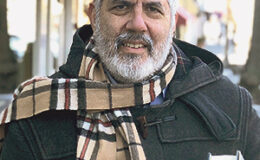
John L’Heureux’s posthumous short story collection, The Heart Is a Full-Wild Beast, proves the old adage that books are made out of books. Within these 28 new and previously published stories, you can hear the echoes of writers who influenced L’Heureux, a Stanford creative writing professor who died in April, as well as the nascent voices of his students. The Heart Is a Full-Wild Beast answers a question that many have asked over the past decade: Whatever happened to the Catholic novel? Not only is this lament misguided, L’Heureux’s creative genealogy suggests Catholicism has bound itself to the DNA of contemporary fiction.
The stories in The Heart Is a Full-Wild Beast serve as a capstone to L’Heureux’s life. Many, if not most, were published in prior collections, but they are organized here according to certain themes. The stories vary in subject matter, from philandering academics to South American coups and black-ops torturers. While there is variety, about half of the stories are about priests: young priests, old priests, ex-priests, and even the ghosts of priests. These stories often explore the gap between what a character expects out of the priesthood and the reality. They are told with a clear-eyed authenticity: L’Heureux was a Jesuit for almost 20 years before leaving the priesthood. Many of these stories, such as The Long Black Line, in which a Jesuit admits he joined because of a roommate’s off-hand comment, or Clothing, in which a man who leaves the priesthood marries an ex-nun, draw upon autobiography.
There are standouts and clunkers among these stories. Witness follows an atheist college professor with loose morals who develops the stigmata. It is the best story in the collection and an example of what the short story can achieve at its best, blending comedic irony with the disconcerting theological idea that grace can be neither earned nor escaped. The instinct to look for grace where it is least expected is a very Catholic one, yet there is a fine line between it and the Romantic urge to dissolve all distinctions. Literary critic Irving Babbitt once wrote that Romanticism conflates strangeness with beauty, and so it often descends into an “esoteric cult of ugliness.” When L’Heureux’s stories take place outside a strictly theological framework, he ends up exploring the hideous for no apparent reason. For example, A Family Affair begins when a family’s deformed infant dies and ends when the father forces his daughter to kill her own dog. Not everything needs to be a Hallmark Christmas movie, but this story is ugly in a gratuitous way.

Even when L’Heureux falls short, however, his prose is strong enough to remind us why he was a mentor to so many writers. In the story Communion, for example, a young, overeager priest chases after men who were late to confession and administers the sacrament outside: “It was like the Middle Ages, really: Priest and penitent huddled at the Church door, the once-a-year reconciliation on the feast of Christ’s birth, the snow falling. It was romantic, beautiful. It was an act of love.” Notice how much he does with so little, how what is at first glance a description of scenery is really the priest’s internal monologue. That’s craft.
L’Heureux’s writing is very much a product of creative writing programs, which, at their best, function like medieval guilds where young writers develop under the guidance of masters. Raymond Carver, who was a Stegner fellow at Stanford before L’Heureux took over the program, looms large in the domestic stories. This Stanford lineage continues through L’Heureux to writers he taught, including Ron Hansen and Tobias Wolff. Wolff inherits his structural creativity and ironic comedy; his story Bullet in the Brain, about a literary critic who gets shot, could be placed right next to L’Heureux’s campus satire No Strings. Hansen, on the other hand, inherits the sentence-level attention to detail, as well as the serious Catholic themes. His novel Mariette in Ecstasy, about a cloistered nun, is almost an extension of L’Heureux’s clergy stories told as a full-blown prose poem. Yet L’Heureux’s web of influence extends far beyond these two writers. He also taught Kathryn Harrison, Harriet Doerr, Samantha Chang, David Henry Hwang, and Jesmyn Ward. And through his teaching, L’Heureux put his students into conversation with the work of his own idols: Flannery O’Connor, Graham Greene, and Evelyn Waugh.
Every few years, an article comes out lamenting the loss of the Catholic writer. Over the past decade, First Things, the Atlantic, the Millions, and the New Republic have all run stories wondering what happened to the Catholic novelist. The Heart Is a Full-Wild Beast, by showing the influence of the great 20th-century Catholic writers on L’Heureux and, through him, his students, offers an answer. The 18th-century political philosopher Joseph de Maistre argued that divine providence was the engine of history. A staunch opponent of the French Revolution, he nonetheless concluded that behind the events of the revolution, one could discern the will of God acting through men, often without their knowledge. As he famously declared, “It is not men who lead the revolution; it is the revolution that uses men.” Similarly, Catholic readers and critics should stop waiting for a new O’Connor or Waugh and should instead view their literary tradition much as de Maistre viewed providence: as a force that moves through history, spreading backwards and forwards, making its distinctive influence felt, even among writers who are not Catholic.
You’ve got “God in you like a stinger,” a woman tells her husband in one of L’Heureux’s stories. So does our literary canon, as L’Heureux’s life and work show.
James McElroy is a novelist and essayist based in New York.














